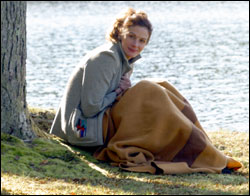1953 WAS AN important year for American women. The English-language translation of Simone de Beauvoir’s The Second Sex arrived; Alfred Kinsey followed up the first Kinsey Report with Sexual Behavior in the Human Female; and Betty Warren, Joan Brandwyn, Giselle Levy, and Connie Baker took their seats in the Wellesley College Art History 100 class taught by Katherine Watson. How is it possible that you haven’t heard of this latter, world-shaking event? Because it’s fictional, a cinematic collision between a headstrong California boho and her uptight students played out in Mona Lisa Smile (which opens Friday, Dec. 19, at Metro and other theaters).
Why this film? Why now? Neither the well-bred, well-read, impeccably dressed seniors nor their well-intended, earnest professor utters the “F” word, but then again, we don’t talk much about feminism today, either. In 1953 that might have been because first-wave feminism was old news, the second wave had yet to crash, and the laundry wasn’t going to fold itself. Fifty years and a third wave later, all three movements are seen as being gauche or pass鮠Or maybe we’re just afraid to bring it up. Or, worse yet, we’ve simply forgotten, because we’re too busy watching Who Wants to Marry a Millionaire? So who better to remind us about feminism than Julia Roberts? No one’s going to accuse her of being a dyke or a man hater.
Roberts’ Katherine turns her upper-crust all-girls classroom on its ear when she insists that Picasso will one day be regarded as highly as Michelangelo, then takes her students to a cold, dank warehouse to witness the unveiling of a Jackson Pollock original. Later, she implores her girls to consider images from popular magazine advertisements and how those ads dictate their daily decisions (and gender roles). She’s like Barbara Kruger ahead of her time, with just a little bit of Robin Williams’ character from Dead Poets Society thrown in for good measure.
THE ADVICE SHE gives her students regarding their personal lives is no less controversial. Katherine is particularly tough on Betty (Kirsten Dunst), but that’s because Betty is tough on her (including an expos頯f Katherine’s unorthodox lifestyle in the student paper). To Betty, who is already married before graduation, a diploma is just a piece of paperno match for her fancy new washer/dryer set. Katherine’s Adbusters-esque lecture on those magazine ads is a direct challenge aimed at Betty in retaliation for the front-page bashing; to both actresses’ credit, you can see the critique beginning to take hold in Betty’s ordered, country-club mind-set.
To bookish but beautiful Joan (Julia Stiles), Katherine suggests Yale Law, but Joan declines so that she can accompany her new fianc頴o Penn State, where she’ll be able to get dinner on the table by 5 o’clock. But Katherine persists, arguing that Joan can have it allmarriage and career. Intending to lobby her case, she stumbles upon Joan’s bridal shower, where Joan tells her she really and truly dreams of raising a family. Katherine walks away in defeat.
With Connie (Ginnifer Goodwin), the requisite cute, spunky, chubby character, Katherine is more of a den mother, and that protectiveness also applies to Giselle (Maggie Gyllenhaal), whose absentee father has left a hole in her life that only affairs with a hunky Italian-language professor and her graying psychotherapist can fill. Significantly, Katherine declines to condemn Giselle’s promiscuous behavior even when she, too, begins to develop an interest in that same hunk. She’s not teaching free love, but it’s certainly not the traditional chaste Seven Sisters curriculum, either.
AT ITS FLIMSIEST, Smile seems designed simply to showcase excellent sets and beautiful costume designand its star, of course. Here, the crusading Roberts is basically Erin Brockovich with a longer skirt and more sensible shoes. And, like Brockovich, Katherine has some problems with men. When her boyfriend shows up unexpectedly from California with a ring in his pocket, she’s offended by his presumptuousness. When she catches the hunky professor in a white lie, she wastes no time in tears or regret. Good thing she teaches at an all-girls school; she seems to grade men on a much harder scale than women.
Though Katherine tells her pupils time and time again to consider both a profession and a family, I’m not convinced that, 10 years after graduation, they’d have much interest in Betty Friedan’s The Feminine Mystique. (Well, I take that back Joan might be intrigued, if she has time between getting her hair done and decorating the den.)
Sure, in theory, you can have it all. But no one in this film does. Both the academic and the housewife pay a price for their choices, and that’s the harsh lesson left out of Katherine’s syllabus.








